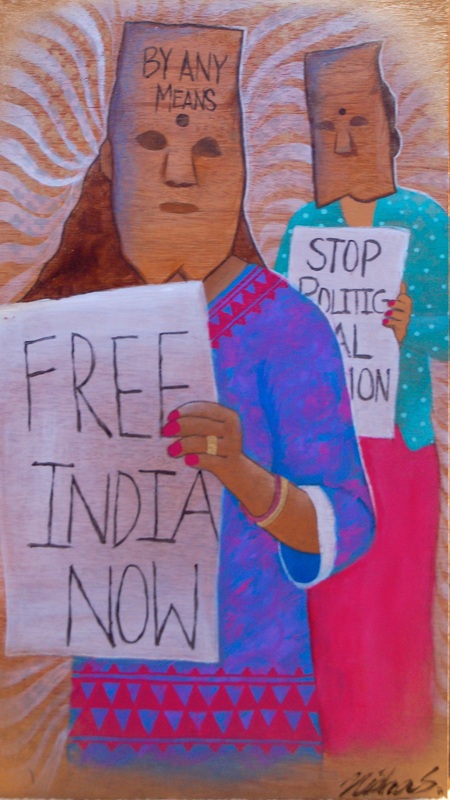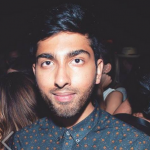“OUR NAME IS REBEL”: Life paths and dream worlds in South Asian Diaspora
Rad Bay Area artists Amman Desai and Nisha Sembi teamed up to explore the history of Anti-hegemonic South Asian dissent in Berkeley in an exhibition called ¨OUR NAME IS REBEL,” and boi have I found my home! As a queer cis-male middle class South Asian invested in dismantling systems of oppression myself, these images inspired me to see my people in a radical new frame. I read them against the myth of the model minority (one that basically advocates for acceptance of systems of oppression in order to get ahead i.e. pursuing “safe” career paths, not protesting etc.). This path, usually taken by upper middle class South Asians who buy into this idea of “achieving financial success through complicity with white supremacy”, often perpetuates anti-black racism, and within many Hindu contexts, Islamophobia in our post 9/11 moment to more successfully assimilate into “the right kind of brown”. In contrast, “OUR NAME IS REBEL” focuses on the anti-colonial Ghadar Party and South Asian women activists who protested Indira Ghandi’s suspension of democracy, highlighting histories that are rarely taught and life-paths rarely supported. By valorizing rebels, Sembi and Desai’s art presents us with a radically alternative way of identifying as South Asian- one that does not assume repressive patriarchy or class ascendancy.

Nisha Sembi / “Free India Now” (2013) / Acrylic on wood. Drawn to the image of masked South Asian women organizing for justice in her hometown, Sembi transposes a Black Panther Party slogan onto a mask, drawing connections between movements.
One important part of this alt approach to South Asian diaspora is the idea of solidarity across social movements. Sembi and Desai move their pieces beyond the arena of single-issue politics by depicting connections between South Asian women to the Black Panther Party in the 70’s (such as Kartar Dhillon, one of the few women Ghadar Party members who was a trailblazing activist and alternative role model, depicted by artist Amman Desai as the Hindu saint Meerabai) when dominant narratives usually show South Asian women as powerless pawns frozen into a patriarchal amber. The historical record of these women’s participation in social movements outside the confines of their own identity politics is a powerful reminder of Audre Lorde’s essay entitled, “There is No Hierarchy of Oppression”. Make no mistake, I’m totes NOT advocating for South Asians to coopt black struggles as their own (seriously, check yourself). What I AM saying is that systems of oppression are interconnected. Dismantling them in one area won’t work if we are perpetuating them in another. To that end, this exhibit opens worlds of possibility.

Amman Desai / “Tinku” (2013) / Linocut print] Ali ‘Tinku’ Ishtiaq an early founding member of Trikone (the world’s first South Asian LGBTQ organization), a co-founder of the Bangladesh Support Network, a co-chair of the International Gay and Lesbian Human Rights Commission, and a co-founder of Queers Undermining Israeli Terrorism.
 Written by Hrishekesh Kashyap: a queer South Asian writer living in San Francisco. He enjoys djing VIPOC bedroom parties of no more than 5 people with a playlist entirely composed of Missy Elliot’s discography.
Written by Hrishekesh Kashyap: a queer South Asian writer living in San Francisco. He enjoys djing VIPOC bedroom parties of no more than 5 people with a playlist entirely composed of Missy Elliot’s discography.
[…] hip hop, or political causes, and mostly to make art she likes. After we saw her work in “Our Name is Rebel” promoting Indian revolutionaries, and realized it was the same artist who designed Word to […]